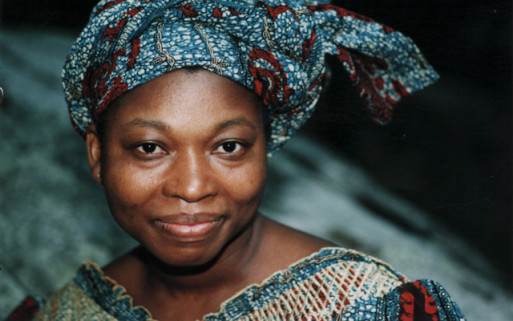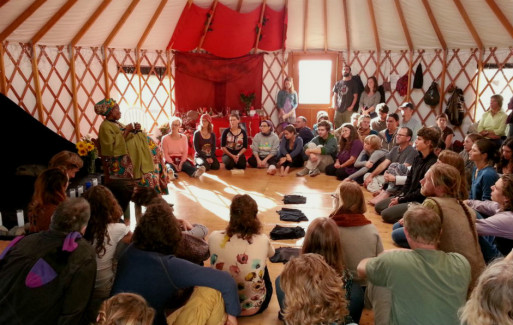Sobonfu Somé, born in the West African nation of Burkina Faso, says she spoke to the elders in her village before she was born, and her name “Sobonfu” reflects her prenatal intent to be “keeper of the rituals.” When she was 20 years old, without knowing much English, she arrived in the United States to fulfill her destiny, and has been traveling the world ever since, sharing the rich traditions of the Dagara people with the world.

Sobonfu Somé
(Credit: yoknyamdabale.files.wordpress.com)
Somé’s website states that “Dagara rituals involve healing and preparing the mind, body, spirit and soul to receive the spirituality that is all around us. It is always challenging to bring the spiritual into the material world, but it is one of the only ways we can put people back in touch with the earth and their inner values.” One of the most powerful tools that Somé uses in her international grief work is the natural response of crying. “When we cry, we allow life back into our body and our spirit,” she says in one of many recordings that preserve her work for future generations.

Somé facilitates a grief ritual
(Credit: weavingearth.com)
She asks, “If we weren’t supposed to feel, would we have feeling? If we weren’t supposed to cry, would we have tears?” Children do not need to be taught to cry; when we are born, it is our way of announcing our truth to the world. Crying, for Somé, is a natural, healthy process that cleanses heavy or stuck emotional energy from a person’s system, freeing them to embrace life more fully. She notes that after we cry, we feel better.
In the Dagara culture, a person who doesn’t cry is considered to be a time bomb, and it is the responsibility of the community — for the sake of the individual’s as well as the group’s wellbeing — to guide them in a purification through grief.
This purification or release of dysfunctional energy takes the form of the grief rituals that Somé is known for in the Western world. These rituals are initiations into a grieving process that does not end when the ritual ends — rather, the ritual is the catalyst for an individual’s evolution.
In a talk at the Ringing Rocks Foundation, Somé described the function of such rituals. “Going through [an] initiation is basically like this: Someone [breaks] your life into thousands of pieces, and then throws them all up into the air, and says, ‘Find the pieces.’ But… the pieces aren’t supposed to be the way they were before.” She goes on to compare this transformation to a lizard shedding its skin — if it tries to crawl back into its old skin, it won’t fit properly. Somé explains that as humans, even if we succeed in putting our old lives on again, we must relive the dysfunction of that phase of our evolution until we are ready to grow through and out of it.
Allowing grief to transform our lives is a sure way of coming back to our fundamental wholeness and living the gifts we were born with. In the video above, Somé describes the many small deaths or full endings that we experience in life, and how processing those losses helps us realize that when something ends, it is always the beginning of something new. Both the end and beginning carry the medicine of personal and collective evolution necessary for each of us to live so fully that “every day, in fact, is a good day to die, and every day is also a good day to be alive.”

 Sobonfu Somé Shares Dagara Grief Wisdom with a Smile
Sobonfu Somé Shares Dagara Grief Wisdom with a Smile


 First the Wealth Gap, Now the U.S. Has a Growing Health Gap
First the Wealth Gap, Now the U.S. Has a Growing Health Gap
 How to Comfort A Dying Loved One
How to Comfort A Dying Loved One
 Our Annual Seven Holiday Gifts for Someone Who Is Grieving, 2024 Edition
Our Annual Seven Holiday Gifts for Someone Who Is Grieving, 2024 Edition














